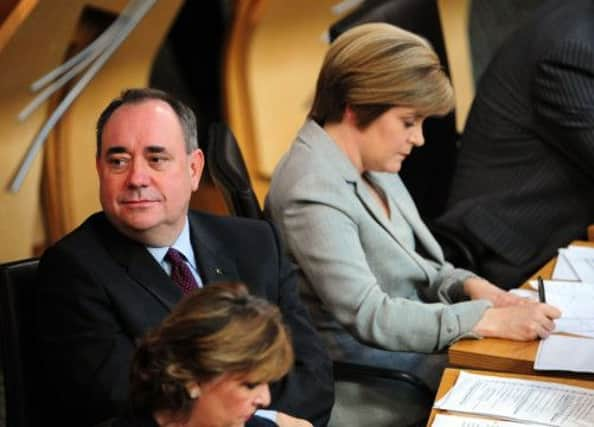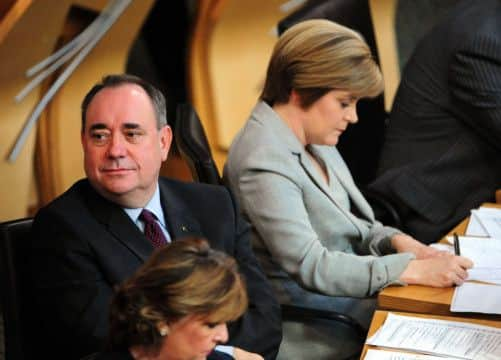Scottish independence polls blow for SNP


One survey showed no increase in support for independence over the last four months and another showed a huge majority of young people supporting the Union.
A new Ipsos Mori poll reveals that, among those certain to vote, 31 per cent would say Yes to independence next year, compared with 59 per cent who plan to vote No. The rest remain undecided.
Advertisement
Hide AdAdvertisement
Hide AdThe figures are unchanged from May, when Ipsos Mori last polled the electorate, suggesting that a summer of campaigning and a series of speeches by Alex Salmond on the case for independence have had little effect on people’s voting behaviour.


In another setback for the independence campaign, a mock referendum of more than 11,000 schoolchildren who will be eligible to vote in next September’s referendum – 16 and 17-year-olds will get a vote – found that almost 9,000 of them would choose to remain part of the UK.
Pupils in Aberdeenshire – where the SNP won every seat in the last Scottish Parliament elections – were asked the same question voters will be faced with next year: Should Scotland be an independent country? About 24.5 per cent voted Yes.
The latest polling came as the Scottish Parliament marked the start of the countdown to the referendum when people will be asked to vote Yes or No to whether Scotland should become independent.
Speaking in Holyrood, Mr Salmond described the proposal for independence as a “common-sense position based on experience”, insisting that the record of devolution had shown that all decisions on tax and spend should now be taken by MSPs. Independence was “the best route to becoming a more prosperous country and also a more just country”, he said.
But as a new report by the respected Institute for Fiscal Studies reveals today that an independent Scotland may need to inflict cuts of up to £5.9 billion as austerity continues to bite, opponents slammed the SNP’s proposals, saying they were putting dogma before the country’s best interests.
“It is the politics of nationalism looking for a justification,” Scottish Labour leader Johann Lamont said.
Ahead of the Labour conference next week, party leader Ed Miliband issued a plea to left-leaning voters in Scotland, insisting that “we need Scotland” to help create a “fairer, more equal society”.
Advertisement
Hide AdAdvertisement
Hide AdDeputy First Minister Nicola Sturgeon hit back, however, saying that the “giants of the Labour movement must be spinning in their graves” over the party’s preference for a Conservative-led UK government, over one voted for in Scotland.
Both sides in the campaign will now embark on a gruelling year as they seek to swing voters to their cause.
Leader of the Better Together campaign, Alistair Darling, unveiled a new poster backing the Union yesterday. On Saturday, pro-independence supporters are set to gather at Calton Hill for a rally backing a Yes vote.
The SNP government’s attention will now turn to the publication of a pivotal white paper on independence, expected in November, setting out the detail of its plans for an independent country, to be up and running from 2016.
Despite the frenzy of activity, however, the Ipsos Mori poll suggests the nation at large continues to be relatively immune to fresh arguments about the choice on offer. It is in line with previous polls over the last year which show that, among committed voters, backing for the Union stands at the high 50 per cent mark, and support for independence in the low 30s.
The poll also suggests that neither side has an advantage among undecided voters, contrary to claims by the Yes side that such voters are favouring their arguments.
The Ipsos Mori poll found that a third of undecided voters are inclined to vote Yes, the same as those who say they may lean to a No vote.
In a special debate yesterday, Mr Salmond rehearsed his arguments in favour of independence. It was, he said, “about giving ourselves the power to make our country as good as it can be. It’s about the right to decide, the ability to make choices”.
Advertisement
Hide AdAdvertisement
Hide AdHe went on: “And this government’s argument – our most important contention – is that the people who live and work in Scotland are the people who are most likely to make the right choices for Scotland.
“It’s not an argument that is subject to statistical manipulation, it is not an argument for a day’s headlines, it is not an argument born of fear. It is a common-sense position based on experience.”
However, Ms Lamont responded that Mr Salmond was attempting to find reasons to back up his belief in Scottish nationalism, saying it rested on “an assumption that the rest of the United Kingdom wants to deny us our rights, our potential, that Scots are more progressive, fairer and more generous”.
This, she said, “insults all those radical voices right across the UK who are as concerned as we are about what is happening in the country today”.
She added: “Let’s make the case, stand up for the United Kingdom, refresh the opportunity to defeat nationalism, do the real job of politics, make and win the political case for the real change we need to make our society stronger and fairer.”
MSPs then exchanged verbal blows over the plan.
Former Liberal Democrats leader Tavish Scott declared that “the only certain aspect is uncertainty”. He added: “It is a walk in the dark. It is opening a door to a pitch-black room. Scots want straight answers.”
For the Scottish Conservatives, fellow pro-UK MSP Jackson Carlaw added: “There is an argument for independence which says there are no certainties, that it is a risk and a gamble and we don’t know for sure but that we believe we can face the opportunities of independence and be successful.
“But the argument that has been put is to be certain where there is no certainty, like the big issues on our currency.”
Advertisement
Hide AdAdvertisement
Hide AdThe Tory party leader, Ruth Davidson, said that with trade bodies all calling for detailed answers, the SNP had so far failed to give clarity: “The SNP has set the bar high for their forthcoming white paper, they now have to deliver.”
But Ms Sturgeon sought to characterise critics as doom-sayers, comparing the pro-independence campaign to the suffragette movement.
She insisted that “every progressive campaign in our history has been met with dreary ‘Can’t do’ voices – just as those who said No to votes for women”.
She added: “Scotland can afford to be an independent country. Let it not be said Scotland cannot afford to be independent.”
Independent MSP Margo MacDonald added: “We will do what other countries have done, we will be able to mould our society in our own image. Our aspirations will rise and I feel our self-respect will grow bigger.”
Last night, the SNP-dominated Scottish Parliament voted in favour of the Scottish Government’s motion in the debate backing independence.
Armed forces
Scottish Conservative leader Ruth Davidson, making her case for the UK, said the British armed forces are “the most professional fighting force on the planet”.
They are “in the top three defence forces around the world” in defence spending as a proportion of the economy, she told MSPs.
Advertisement
Hide AdAdvertisement
Hide Ad“We are stronger together as part of the UK armed forces,” she said.
“Scots around the world, proud to serve with the Union flag on the arm of their uniform, are part of the most professional fighting force on the planet.
“Our integrated land, sea and air platforms allow us to respond to conflicts and crises in all parts of the globe and I believe the defence of our allies, our response in the world, and the safety and security of our people at home are best served there.”
Veteran nationalist Margo MacDonald, a former SNP MP who now sits as an independent MSP, asked if Ms Davidson’s portrayal of the British armed forces was a joke.
“There are fewer men under arms in the armed services now than at the start of the battle of Waterloo,” she said.
“Recently, in response to Syria, it was reported that the American fifth fleet had moved into the Persian Gulf, the sixth fleet had moved to the eastern Mediterranean, while the British had a submarine somewhere in Cyprus. Are we joking about this great British defence?”
Ms Davidson replied: “I believe that on the imprint of our footprint around the world we are in the top three defence forces in the world, our commitment to GDP in how we fund it.
“The future alliances and security that we have is best served by a British army, navy and air force not on the division of personnel, platforms, assets and hardware.
Advertisement
Hide AdAdvertisement
Hide Ad“If Ms MacDonald is making the point that she sees that the size of our imprint is less than it once was, then breaking up our nation and defence footprint is not the point that she is trying to make.”
ELSEWHERE